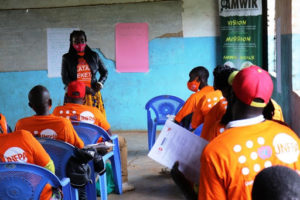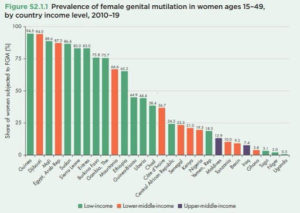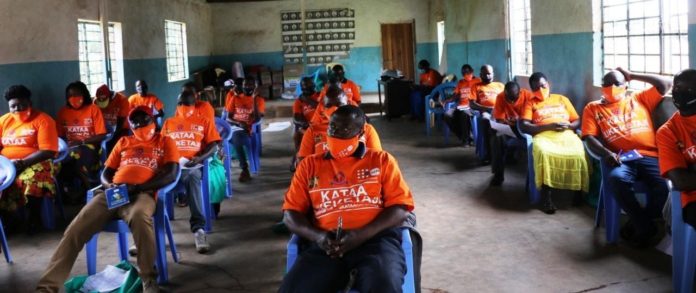By Tebby Otieno
Migori County, Kenya: Teresia Nyabaraka is a Female Genital Mutilation (FGM) survivor. Born and bred Kuria, Migori County, her parents took her for the cut at the age of eight.
Nyabaraka narrates how she had a problem with her eyes, this kept her from school for several days. Sometimes this could happen till such a time that her teachers could reach out to her parents. She says she never used to receive any treatment for her condition. The more she stayed out of school, the more the risk of being married off.
At the age of thirteen, she was married off. “I gave birth to my first child when I was fifteen years. It was not easy; I believe if it was during this time then I could have undergone a cesarean. By the time I was nineteen, honestly, I was having three children.” She reveals.
Nyabaraka was ignorant about the negative impacts of FGM, she joined the league of those who cut the girls. When she delivered her firstborn she took her for the “Wedding ceremony”, this is how FGM is referred to in her community. That was not all, as she helped, her second daughter undergo the cut.
One day one of the girls she had participated in cutting, over bled and she could not stop the bleeding. This became Nyabaraka’s turning point with the razor blade.

“I took her to the hospital. I thought she was going to die. That put a lot of fear in me. Up to now, I fear seeing blood. I have seen many girls over bleed. There is even a case where people feared taking one girl to the hospital and she died at home” Laments mother of seven.
She later joined an organization that trained her among others in the community on the impact of FGM. This is when she also became a trainer of trainers. Some of the training she attended with her daughters. She admits she gained a lot of knowledge that is helping her to date.
Teresia Nyabaraka is now a Community Health Volunteer (CHV) in Kuria. She creates awareness in her community to end FGM. She is also a member of the Kuria Women Disability Development, where she advocates for girls’ right to education. Two of her five daughters have not undergone FGM, this makes her very happy and proud of her achievements.
“I want to tell people to stop FGM because this is the same as telling them to get married. Let us circumcise the brains of girls. This is what will make them live a good life and go to school” Says Nyabaraka.
Kuria community is a group of residents in Kenya’s former Nyanza Province to the South-west. According to 2019 census data released by the Kenya National Bureau of Statistics, the community has a population of 305, 385. Kuria is one of the areas where FGM prevalence rate is high.
According to UNICEF at least four million women and girls in Kenya have undergone the practice. The report also indicates that one out of every five women and girls aged 15 to 49 has been subjected to the practice. However, in a 2019 national address on the issue, President Uhuru Kenyatta put the figure at approximately 9.3 million girls and women who have undergone FGM in Kenya.
Since then, efforts to combat this cultural practice gained momentum countrywide with various policymakers coming on board at the grass root levels.
Campaigns to end FGM in Kuria have received support from government officials. This follows President Uhuru Kenyatta’s commitment that Kenya should be zero tolerance to FGM by 2022.
Assistant chief Iraha sub-location, Gati Thomas, says the population of women who have undergone FGM is still higher than those who have not. He uses his office to rescue girls during the cutting season.
“When someone reports to my office that they don’t want their child to be cut we take her to rescue center until the season is over. If you cut girls, we will apply the law” Assistant chief, Thomas warns Kuria residents.
Mabera sub-location assistant chief, John Marwa says FGM is illegal and this gives his office power to take legal action.
“We are currently creating awareness in different community forums where we invite ambassadors, who talk of disadvantages of FGM. Those who will prove tough we will apply the law” Warns the assistant chief.
The effect of Corona Virus Disease (COVID-19) has had far-reaching effects on communities that practice FGM. The closure of schools affected by the government as one of the measures to control the spread of the virus made it difficult to rescue girls.
Anti-FGM activist, in Kuria West Sub-County Catherine Chacha, says the cut started very early and its peak was in the months of October and November 2020. Issues of sexual gender-based violence and child defilement also increased
“We received girls who are bleeding and those who needed to get more drugs because of that. What caught our eyes we even received girls who had run away from the cut only to realize that they were anaemic. If they had undergone the cut, then they would have even lost their lives.” She says.
Chacha has been doing a lot of talks to encourage speaking up to end FGM issues. She also does a lot of sensitization to adolescents and youth on issues of sexual reproductive health rights.
Chacha is a nurse in a government health facility in Migori town. She also does a lot of sensitization to adolescents and youth on issues of Sexual Reproductive Health Rights (SRHR). She emphasizes that FGM has zero health benefits and the well-being of the girls.
“FGM subject our children at a very younger age to pain. There are issues of bleeding some of them may go into shock because of excess bleeding. We have people who developed keloids, we have a formation of scars which bring issues during delivery to some women” She narrates.

FGM practice in Kuria is currently at 84%. This is a decrease from 96% about ten years ago. Executive Director at Msichana Empowerment Kuria, Natalie Robi acknowledges progress as an indication that people are willing to change.
Msichana Empowerment Kuria is a woman and girl-led organization. It works with girls within the Kuria community focused on ending FGM and child marriage while addressing some of the related issues that contribute to the risks of girls undergoing FGM.
“Increasingly we are seeing girls being offered an opportunity to go to school as compared to before. More and more people are converting to a church that explicitly talks about FGM is not part of the religion. Another thing is girls born in families where one of the parents is not from the community, has helped a lot” She says.
She further urges all stakeholders to support these communities, and contribute to the realization of the sustainable development goals which is part of vision 2030.
“We need to make sure that everybody in the community takes responsibility because it is a collective choice. This is just for us and the development agenda. We have seen that FGM has a huge cost on development across the country and if as a community we are able to end FGM, then we are able to contribute to the development of the country” The young ambitious Robi adds.
Survivors of FGM experience health complications that might be life-threatening. The highest level being psychological trauma as a result of shock and excessive bleeding at the point of the cut if not arrested in time. Tony Mwebia, Executive Director at Men End FGM Foundation says there is a need to have psychosocial support for survivors of FGM so that they can heal over time and speak up and share their experiences
“Some of them fistula. Some of them have excessive pain at the point of giving birth where they feel like their loved ones have betrayed them because FGM is done by people who are so close to you. Also the thing of being operated in the open places and there are people pinning you down and excessive pain also traumatizes the young children” Says Mr. Mwebia.
Mwebia further says that the President’s commitment to eradicate FGM by 2022 has made a significant impact by opening up conversations and bringing donors and politicians on board. However, there are some challenges likely to affect the deadline including 2022 general elections.
“If people really concentrate on grassroots sensitization and mobilization, then we can be able to have FGM privileges on parts of the communities. We will make significant gains in the fight against FGM by next year but to say that, it is possible to eradicate it completely by next year is a big dream. The goodwill is there because the president has made the commitment” He says.
According to UNICEF, FGM is a violation of human rights that every girl and woman has the right to be protected from. Kenyan law passed in 2011 prohibits FGM and imposes tough penalties on perpetrators and those abetting the practice both in the country and across borders including medical caregivers.
An international women’s rights organization Equity Now in collaboration with the Anti-FGM Board, Kenya and the Association of Media Women in Kenya (AMWIK) recently launched a new toolkit to support journalists reporting on FGM. The toolkit was written by leading FGM experts, with contributions from some of the best journalists. According to Equity now, the comprehensive guide will help journalists navigate and learn how to report on FGM with accuracy, sensitivity, and authority.
The toolkit is accessible online; https://d3n8a8pro7vhmx.cloudfront.net/equalitynow/pages/3564/attachments/original/1616532663/Reporting_on_Female_Genital_Mutilation_-_A_Toolkit_for_Journalists_and_Editors_-_EN.pdf?1616532663














